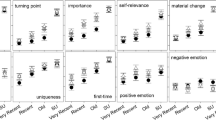Abstract
Adults described and dated two kinds of first remembrances: a personal event memory (the recollection of a personal episode that had occurred at some time in some place) and a memory fragment (an isolated memory moment having no event context and remembered, perhaps, as an image, a behavior, or an emotion). First fragment memories were judged to have originated substantially earlier in life than first event memories—approximately 3 1/3 years of age for first fragment memories versus roughly 4 years of age for first event memories. We conclude that the end of childhood amnesia is marked not by our earliest episodic memories, but by the earliest remembered fragments of childhood experiences.
Article PDF
Similar content being viewed by others
Avoid common mistakes on your manuscript.
References
Bruce, D., Dolan, A., &Phillips-Grant, K. (2000). On the transition from childhood amnesia to the recall of personal memories.Psychological Science,11, 360–364.
Conway, M. A. (1996). Autobiographical memories and autobiographical knowledge. In D. C. Rubin (Ed.),Remembering our past: Studies in autobiographical memory (pp. 67–93). Cambridge: Cambridge University Press.
Conway, M. A., &Pleydell-Pearce, C. W. (2000). The construction of autobiographical memories in the self-memory system.Psychological Review,107, 261–288.
Conway, M. A., &Rubin, D. C. (1993). The structure of autobiographical memory. In A. E. Collins, S. E. Gathercole, M. A. Conway, & P. E. M. Morris (Eds.),Theories of memory (pp. 103–137). Hove, U.K.: Erlbaum.
Dudycha, G. J., &Dudycha, M. M. (1933a). Adolescents’ memories of preschool experiences.Journal of Genetic Psychology,42, 468–480.
Dudycha, G. J., &Dudycha, M. M. (1933b). Some factors and characteristics of childhood memories.Child Development,4, 265–278.
Eacott, M. J., &Crawley, R. A. (1998). The offset of childhood amnesia: Memory for events that occurred before age 3.Journal of Experimental Psychology: General,127, 22–33.
Gardiner, J. M., &Richardson-Klavehn, A. (2000). Remembering and knowing. In E. Tulving & F. I. M. Craik (Eds.),The Oxford handbook of memory (pp. 229–244). Oxford: Oxford University Press.
Howe, M. L. (2000).The fate of early memories: Developmental science and the retention of childhood experiences. Washington, DC: American Psychological Association.
Howe, M. L. (2003). Memories from the cradle.Current Directions in Psychological Science,12, 62–65.
Howe, M. L., &Courage, M. L. (1993). On resolving the enigma of infantile amnesia.Psychological Bulletin,113, 305–326.
Howe, M. L., &Courage, M. L. (1997). The emergence and early development of autobiographical memory.Psychological Review,104, 499–523.
Johnson, M. K., Foley, M. A., Suengas, A. G., &Raye, C. L. (1988). Phenomenal characteristics of memories for perceived and imagined autobiographical events.Journal of Experimental Psychology: General,117, 371–376.
Kotre, J. (1995).White gloves: How we create ourselves through memory. New York: Free Press.
Malinoski, P., Lynn, S. J., &Sivec, H. (1998). The assessment, validity, and determinants of early memory reports: A critical review. In S. J. Lynn & K. M. McConkey (Eds.),Truth in memory (pp. 109–136). New York: Guilford.
Miles, C. (1893). A study of individual psychology.American Journal of Psychology,6, 534–558.
Mullen, M. K. (1994). Earliest recollections of childhood: A demographic analysis.Cognition,52, 55–79.
Multhaup, K. S., Johnson, M. D., &Tetirick, J. C. (2005). The wane of childhood amnesia for autobiographical and public event memories.Memory,13, 161–173.
Nabokov, V. (1966).Speak, memory: An autobiography revisited (rev. ed.). New York: Putnam.
O’Keeffe, G. (1977).Georgia O’Keeffe. New York: Penguin. (Original work published 1976).
Pillemer, D. B. (1998).Momentous events, vivid memories. Cambridge, MA: Harvard University Press.
Pillemer, D. B., &White, S. H. (1989). Childhood events recalled by children and adults. In H. W. Reese (Ed.),Advances in child development and behavior (Vol. 21, pp. 297–340). Orlando, FL: Academic Press.
Robinson, J. A. (1992a). Autobiographical memory. In M. M. Gruneberg & P. E. Morris (Eds.),Aspects of memory: Vol. 1. The practical aspects (2nd ed., pp. 223–251). London: Routledge.
Robinson, J. A. (1992b). First experience memories: Contexts and functions in personal histories. In M. A. Conway, D. C. Rubin, H. Spinnler, & W. A. Wagenaar (Eds.),Theoretical perspectives on autobiographical memory (pp. 223–239). Dordrecht: Kluwer.
Rubin, D. C. (1982). On the retention function for autobiographical memory.Journal of Verbal Learning & Verbal Behavior,21, 21–38.
Rubin, D. C. (2000). The distribution of early childhood memories.Memory,8, 265–269.
Salaman, E. (1970).A collection of moments: A study of involuntary memories. London: Longman.
Tulving, E. (1983).Elements of episodic memory. Oxford: Oxford University Press, Clarendon Press.
Tulving, E. (1985). Memory and consciousness.Canadian Psychology,26, 1–12.
Usher, J. A., &Neisser, U. (1993). Childhood amnesia and the beginnings of memory for four life events.Journal of Experimental Psychology: General,122, 155–165.
Waldfogel, S. (1948). The frequency and affective character of childhood memories.Psychological Monographs,62 (Whole No. 291).
Wetzler, S. E., &Sweeney, J. A. (1986). Childhood amnesia: An empirical demonstration. In D. C. Rubin (Ed.),Autobiographical memory (pp. 191–201). Cambridge: Cambridge University Press.
White, S. H., &Pillemer, D. B. (1979). Childhood amnesia and the development of a socially accessible memory system. In J. F. Kihlstrom & F. J. Evans (Eds.),Functional disorders of memory (pp. 29–73). Hillsdale, NJ: Erlbaum.
Wilson, E. O. (1994).Naturalist. Washington, DC: Island Press.
Woolf, V. (1976).Moments of being: Unpublished autobiographical writings (J. Schulkind, Ed.). New York: Harcourt Brace Jovanovich.
Author information
Authors and Affiliations
Corresponding author
Additional information
Financial support was provided by grants from the Social Sciences and Humanities Research Council of Canada and from the Faculty of Graduate Studies and Research, Saint Mary’s University. L.A.W.-O. is now at the Department of Computer Science, University of Toronto. K.P.-G. is now at the Department of Psychology and Research in Education, University of Kansas.
Electronic supplementary material
Rights and permissions
About this article
Cite this article
Bruce, D., Wilcox-O’Hearn, L.A., Robinson, J.A. et al. Fragment memories mark the end of childhood amnesia. Mem Cogn 33, 567–576 (2005). https://doi.org/10.3758/BF03195324
Received:
Accepted:
Issue Date:
DOI: https://doi.org/10.3758/BF03195324




